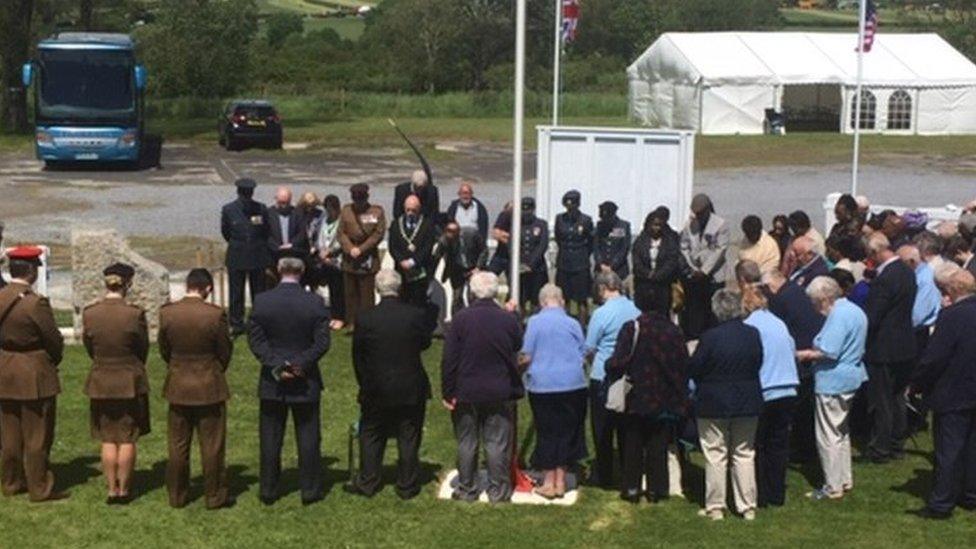War: How those who are left behind remember the fallen
- Published
As services take place across the country to honour the fallen, four people tell how they spend Remembrance Sunday and what it means to them.
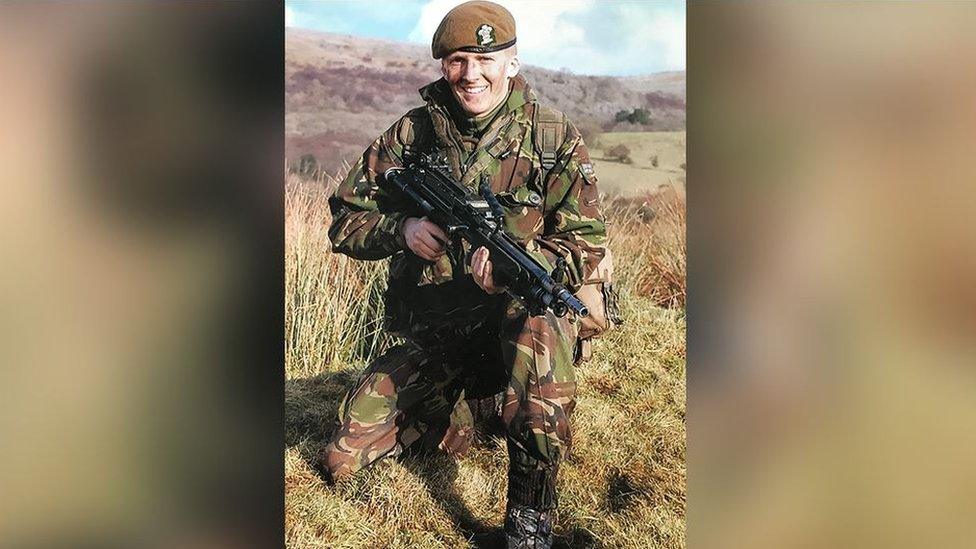
Pte James Prosser died in Afghanistan in 2009
Sarah Adams, 53, of Cwmbran, lost her son Pte James Prosser in 2009 to a roadside bomb in Afghanistan.
This year - like every year since his death - she will attend a service at Pontnewydd Cenotaph in Cwmbran, Torfaen.
"To me, every day is a remembrance day, but this does feel special as I know other people are also thinking of him," she said.
"Family, friends and some of James's comrades will attend the service, and this coming together is a huge support for me."
Pte Prosser - who Ms Adams describes as "quiet with a quick wit" - joined the Army in 2008 after deciding he didn't want to work in an office.
In 2009, he was deployed to Afghanistan with the 2nd Battalion Royal Welsh.
But on 27 September 2009, he was on patrol in the northern Helmand province, when his Warrior armoured vehicle was hit by an improvised explosive device (IED).
The vehicle was thrown a few feet in the air and Pte Prosser suffered serious head wounds.
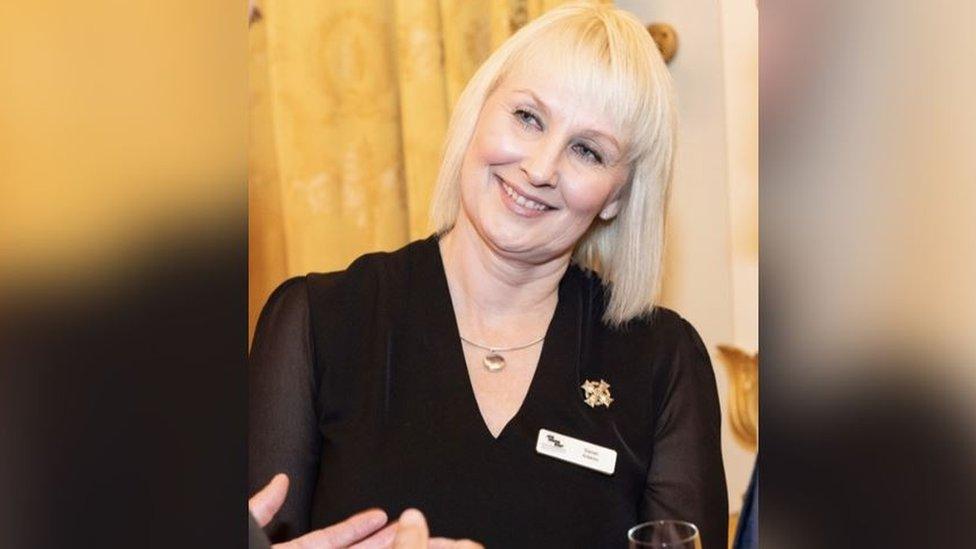
Sarah Adams always spends Remembrance Sunday at Pontnewydd Cenotaph in Cwmbran
Ms Adams, who is an ambassador for ABF The Soldiers' Charity, formerly the Army Benevolent Fund, said: "There is not a day that goes by that I don't think of him.
"He is in my mind all the time, with little things making me laugh or be upset.
"You learn to cope with the grief but I don't necessarily think it gets easier.
"As more time passes - ten years now - you are just aware of how much he has missed, such as seeing his nephews grow up."
For Ms Adams, as she attends a service at the cenotaph which bears James's name, Remembrance Sunday does bring some healing.
She said: "Grief is very lonely and isolating, so I take comfort in people coming together.
"James's friends are always very good at telling me stories about him and lifting the mood.
"It is good that people publicly remember the sacrifices that those like James have made.
"It will be a hard day, but it is important for everyone to see and remember."

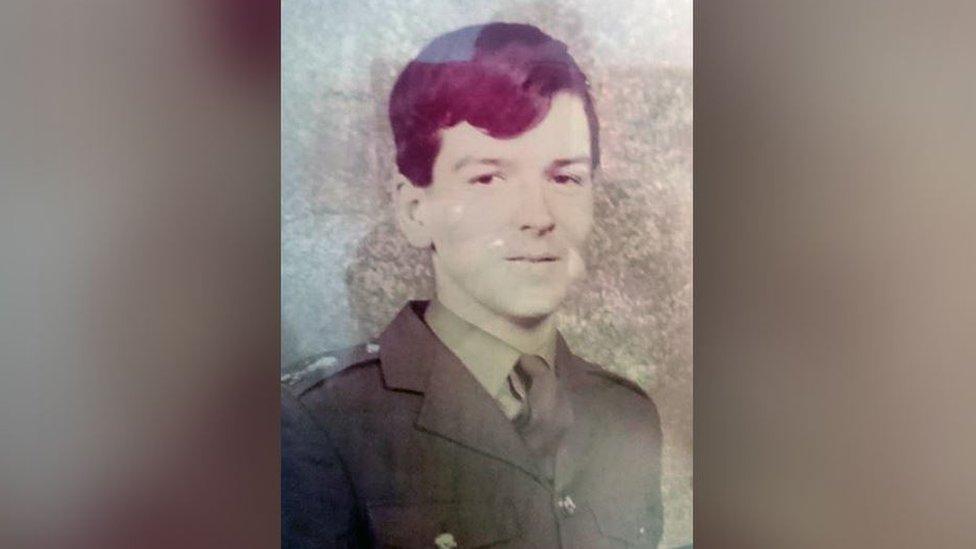
Guardsman Peter Edwards, who died aged 19 during the Falklands conflict
Barbara Royles, 62, of Llandyrnog, Denbighshire, is the sister of Guardsman Peter Edwards, who died age 19 aboard the RFA Sir Galahad during the Falklands War.
Gdsm Edwards, of the 1st Battalion Welsh Guards, was aboard the fated landing craft when it was bombed by Argentine warplanes on 8 June 1982, leading to the deaths of 48 soldiers and crewman.
The ship was so badly damaged, it was later towed out to sea and sunk as a war grave.
Mrs Royles, a carer, said: "Peter was quiet and very environmentally conscientious. He used to like to cycle for miles.
"But he read lots of books about the army and navy and was proud to be in the Welsh Guards."
Mrs Royles said her late parents Evelyn and Gordon never recovered from their son's death.
"There was always a sadness around them," she said. "And we siblings coped in our different ways.
"I wasn't that close to him at the time he died as I had already left home, but I have never forgiven Argentina for killing him."
The body of Gdsm Edwards was never recovered from the Sir Galahad, and Mrs Royles has since visited the Falklands three times to pay her respects.
During her most recent trip - from which she has just returned - she stayed in Liberty Lodge, accommodation for veterans and family members provided by the Falklands Veterans Foundation.
She said: "I go to the Falklands to feel closer to Peter and I find it very healing. It's a lovely place and I feel at peace."
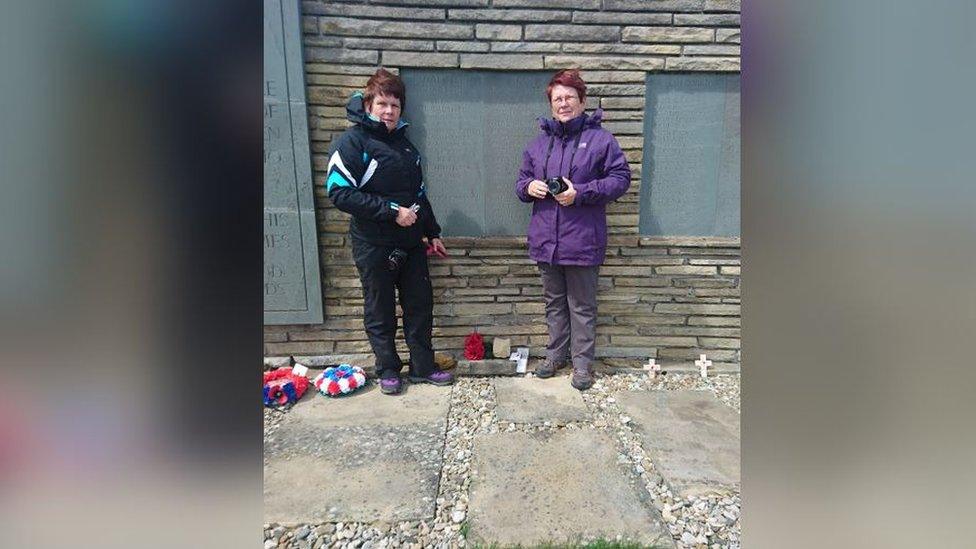
Barbara Royles (in purple) and her sister Mandy Perkins recently visited the Falkland Islands to pay their respects to their brother
This Sunday, like every Remembrance Sunday since Gdsm Edwards' death, Mrs Royles will be attending a service at her local church in Llandyrnog.
"I've never missed a service," she said. "But it is not just for Peter, it is for all the people who have died.
"My whole family comes - all the grandchildren - and we lay a wreath at the cenotaph where his name is.
"Some people have said to me that his death was a long time ago and I should stop being upset, but nobody forgets their brother.
"We need to remember him."

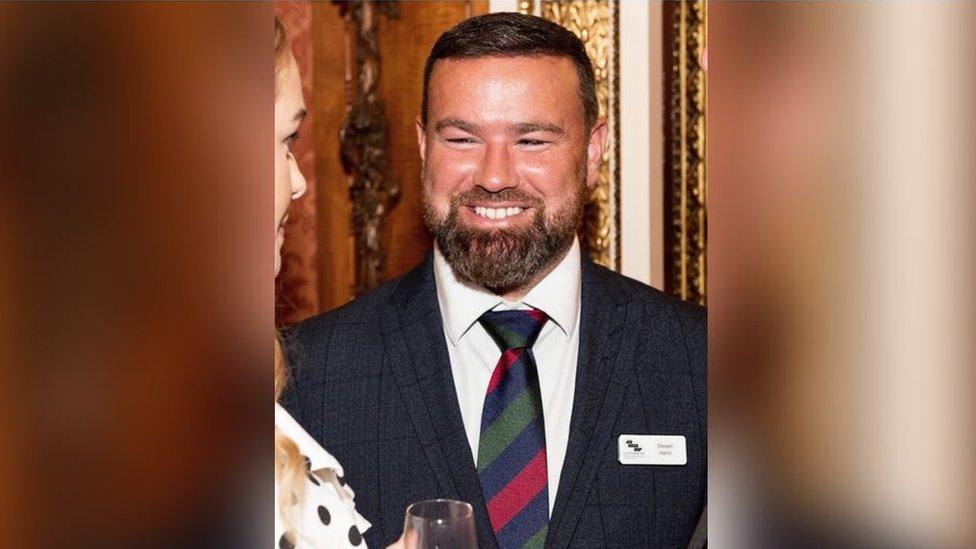
Guardsman Stewart Harris, of 1st Battalion Welsh Guards, lost three comrades while serving in Afghanistan
Stewart Harris, 35, of Rhyl, Denbighshire, lost three comrades while serving in the 1st Battalion Welsh Guards in Afghanistan in 2012.
He said: "I joined the forces when I was 17 and went on to serve in Bosnia, Northern Ireland, Kosovo, Iraq and Afghanistan.
"My last tour in Afghanistan began in 2012, but it wasn't a fighting role. We were there in an advisory capacity, handing control back to the Afghanistan forces."
On 1 July 2012, however, a member of the Taliban masquerading as an Afghani police officer opened fire in a compound, killing three of Gdsm Harris's comrades.
He himself was wounded, suffering slight brain damage and also sight and hearing loss.
He subsequently spent two years recovering in Birmingham's Queen Elizabeth Hospital and continues to suffer from PTSD.
"Dealing with my mental health has been the worst, but I have been supported by ABF The Soldiers' Charity and have found playing golf better than any medicine," he said.
"It is okay to be sad sometimes, but you need to find hobbies and things that make you feel good to stop you from going to the bottom."
This Remembrance Sunday, Gdsm Harris will attend a service in Rhyl with other Welsh Guards, laying a wreath for his comrades.
He said: "It's awful that these men are gone. Their families have been robbed of sons, brothers, dads.
"Losing them was like losing brothers and it's hard to talk about."
But Gdsm Harris doesn't intend the day itself to be too sombre.
"You can pay respect while still celebrating their lives," he added. "The boys would not have wanted people to mope for one second.
"Of course there will be some tears, but there will be lots of veterans there and it will also be a happy occasion."

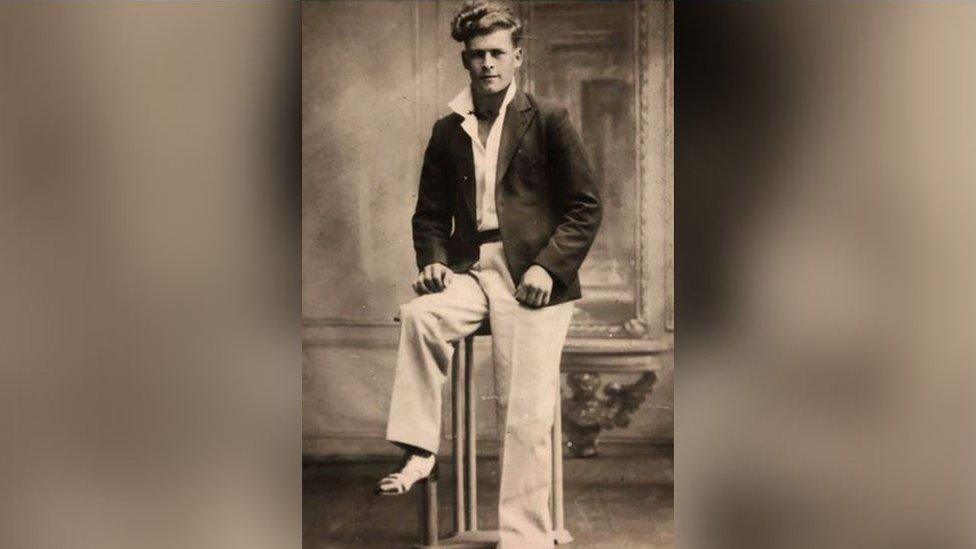
Leading Seaman Claude Leslie Arkell before World War Two began
Dawn Davies, 73, of Merthyr Tydfil, will be attending a Remembrance service at Cardiff Castle to honour her late father.
Leading Seaman Claude Leslie Arkell, from Troedyrhiw, near Merthyr Tydfil, served in the Royal Navy during World War Two, being torpedoed three times.
Mrs Davies said: "When Dad was in the Bay of Bombay [now Mumbai], he saw a man who was painting a ship fall into the water.
"He dived into rescue him and saved his life, but he got a big rollicking for jumping in the water."
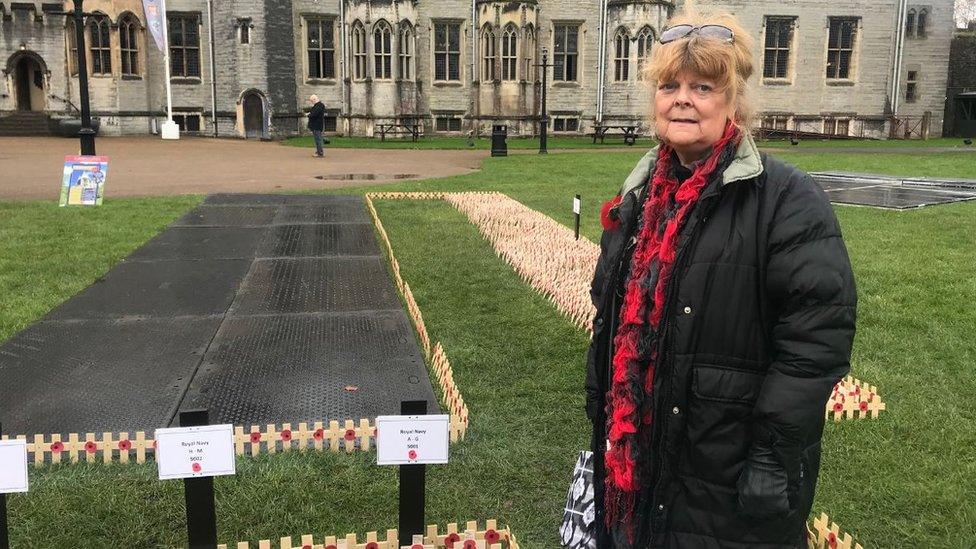
Dawn Davies attending the Field of Remembrance at Cardiff Castle
Following this rescue mission, Leading Seaman Arkell got oil on his lungs from a slick that was in the water, and began to suffer from emphysema.
He was discharged from the Navy in 1944 and died in 1972 from complications at the age of 61.
Mrs Davies said: "Although he didn't die in the war, it affected his whole life.
"My mother used to say that when he was sleeping, he would jerk around and shout 'action stations'."
On Remembrance Sunday, Mrs Davies will attend a service at Cardiff Castle, where a wooden cross is planted bearing his name.
She said: "Dad fought for the country and I feel we need to have a quiet moment to remember this.
"We need to respect what he and others sacrificed.
"I think of him all the time, especially on his birthday and in the run-up to Christmas, which he loved.
"But I find the Remembrance Service very important. It is emotional but satisfying to come and reminisce about what he did."
- Published5 July 2016
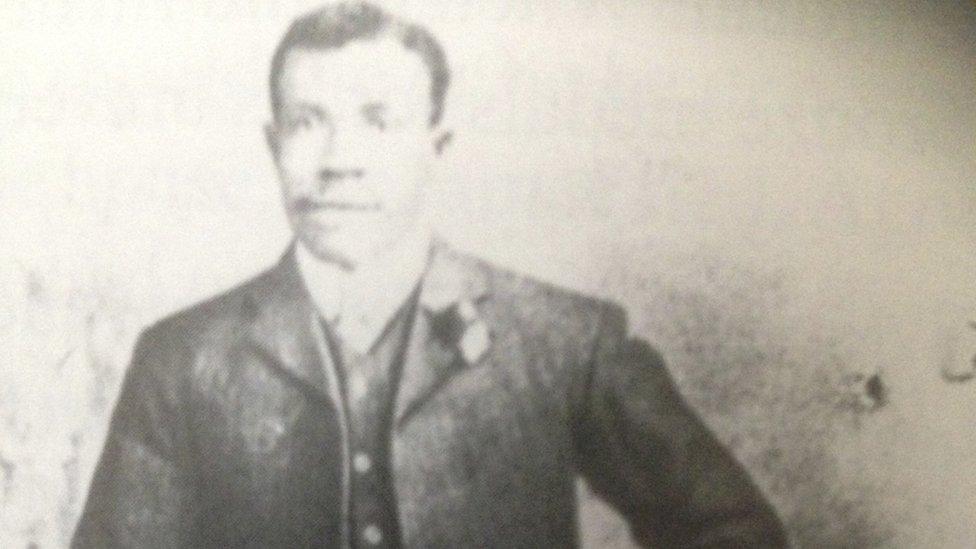
- Published7 January 2019
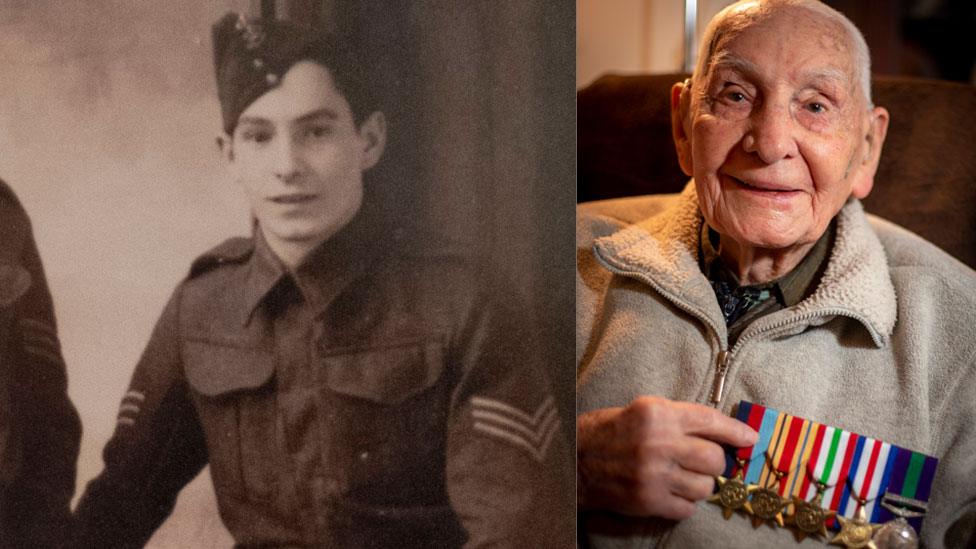
- Published3 January 2019
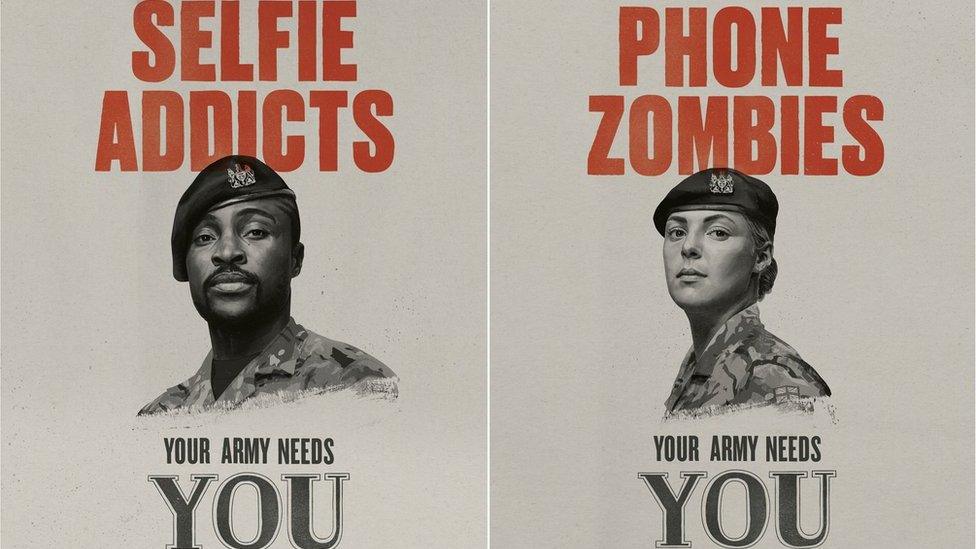
- Published6 June 2019
